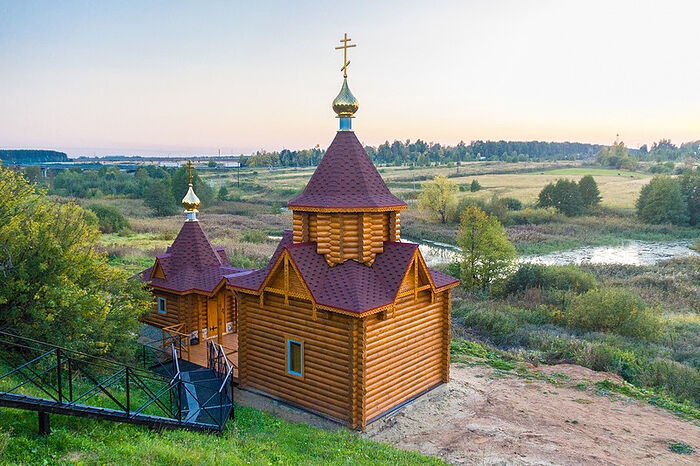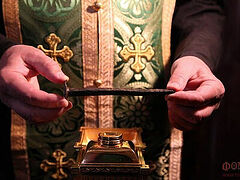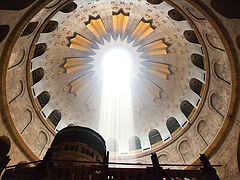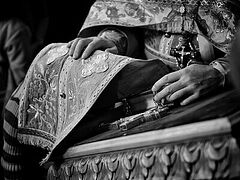Part 1: “Complaints are the visible display of our inner discontent”
 The chapel by the spring in Vorotynets
The chapel by the spring in Vorotynets
Dear God, get me out of this sewage
The feeling of holiness is inherent in man regardless of whether he wants it or not. Another thing is how exactly he treats holiness and holy relics—with love and respect, in other words, having the fear of God, or with infernal fear and hatred. Heaven forbid we should experience the latter—this is exactly how, I think, man forfeits the likeness of God and puts himself at the disposal of the power of darkness. The consequences will come, be it for the man himself or for the whole nation. I think that’s what we are reaping in our days.
“You are right, Father Andrew,” I responded. Our spiritual state is not the best right now. I wonder, could we view this unenviable state as our cross and treat it accordingly?
Batiushka suggests exploring this issue further:
“I often tell my parishioners, “You acted according to your spiritual capacity, right? You didn’t set out to do wrong, did you? You always try to do good, but it just doesn’t work that way. But why is that? It happens because you didn’t have enough spiritual strength. In other words, you acted as well as your spiritual strength allowed it. But this “good” is seen as “bad” in your spiritual estimation. We tend to overestimate ourselves a little. We always think we could do better, and yet we don’t. Why is that? It is because of our spiritual state. Remember when the apostle Peter said, “Even if everyone else abandons you, I certainly won’t”. But he did! The odds were against him; it was beyond his spiritual strength. He was unable to stand strong. And the Lord saw that he wouldn’t be able to. Therefore, we must remain critical of ourselves and never overestimate. As for self-loathing, discouragement, feeling desperate—no, we mustn’t do that. We should switch to a positive self-programming: I must do better, and I will try to do things better. I know a priest, and he is a truly spiritually enlightened and experienced priest, who people think of as an elder. Once, someone repented before him of a repeated sin. Batiushka tells him, “Look! Do you really think our spiritual life progresses from victory to victory? Please! Give me a break! We fall and get up, and then we fall to get up again. But the idea here is that we always rise back up towards the Lord.”
Metropolitan Anthony of Sourozh also wrote about this. If everyone is dressed in white garments but I’m dirty all over, I will still justify myself saying, “Lord, but I was coming to You.” God is sought by someone who falls in His absence. If someone has it “all good,” he may not even need God. That is why God will surely allow us to fall, thus showing how weak we are. And we will keep on falling only to realize yet again: “Lord, we can’t manage without You.” And then we’ll get up, of course. But, I reiterate: excessive self-criticism, self-mockery, and self-ridicule, in my opinion, have nothing to do with repentance and humility. The Bible is a bulky book, but it speaks about one and the same thing: how a man fell away from God—and how God kept bringing him back to Himself.
“It turns out,” I put my two cents’ worth here, “one of man’s major appeals to God is to get me out of this sewage.”
Fr. Andrew laughs:
“Of course! That’s a pretty accurate comparison. Besides, you know, when the so-called “window to Europe” and to the West in general was hacked open,1 everyone thought that it was our chance to drink from a clean, fresh spring of water. Wrong! It was sewage! We got into so much trouble that it’s even too shameful to speak about it. The problem though is that we can’t really shut down this source right away. And the real issue is that we were badly intoxicated with that stuff pouring into our souls and minds.”
Life with God is no small feat
“But, Father Andrew, in this case,” I replied, “do we have any moral right to dismiss Holy Rus’ as a myth, possibly a pious one, but still, just a fairy tale? As a priest, you constantly witness people making their confession to Christ...”
Father Andrew was delighted to hear this.
“This is what gives me an opportunity to say that Holy Rus’ does exist, and it is not a phantom. Our people strive to attain holiness and yearn for it in a good way, I assure you.”
“In other words, a priest can still learn as he confesses others, acting as a witness? Is confession also an opportunity for the priest to learn?”
As you witness the penitential dialogue between man and God, you become convinced again and again that Holy Rus’, with its persistent yearning for God, hasn’t gone anywhere
The answer came in a serious and thoughtful vein:
“You know, your question means you came well prepared for this conversation. Because it does happen at times that a priest hears confessions that profess something new to him. Occasionally, a penitent confesses in such a manner that you realize that he’s deeper, more wholesome and spiritual than I am. So, as you witness the penitential dialogue between man and God, you become convinced again and again that Holy Rus’, with its persistent yearning for God, hasn’t gone anywhere. Back in the day, the Sower planted a seed in our land. In order for it to grow, we must create favorable conditions. But it often happens that because of our sins, apostasy, and betrayal, the conditions can become extremely adverse, as they were during those seventy years of militant atheism. But the seed is still there—and it continues to grow—just like it was sown by Holy Prince Vladimir of Kiev. And it still keeps on growing.
Sure, it was never free from challenges. Just look at the history of Russia—there have been so many tribulations, so many “alien weeds” that tried to crush that seed, and so many attempts were made to scorch it. And so today, we are living through such particular times, when our spiritual vision is still clouded and we automatically keep thinking we can live without God. But you know, a part of us is already awakening. And these people insist: We cannot live without God. No matter how much grandeur there was in the Soviet Union—for we tried to build heaven on earth, only without God—where did we all end up as a result? It just doesn’t work without God; man’s life won’t ever feel complete with no more than a full belly and swollen pockets. This realization, often coming reluctantly if not timidly, is handed down from generation to generation. To live with God, as it turns out, isn’t about lighting a candle. But we sometimes wish we could make do with just that, don’t we? The Kingdom of Heaven is about my relationship with both God and people. We can’t say, “I don’t love my neighbor, but I do love God.” Kindness and kind-heartedness signify the presence of God’s grace. Sometimes even that famed largesse of the Russian soul helps us understand it.
I will tell you the following story. A Russian girl got married to a wealthy German. Apparently, it happened during the first year of their married life. All of a sudden, in January, she had a craving for strawberries. But this German couldn’t get his head around her desire to splurge on those silly strawberries in January, when February is around the corner and it will be three times cheaper. And how can you explain that to the average European? No such question ever exists for the Russian soul—why she suddenly wants strawberries. But she wanted them, all the more since he had the means to get them. But he hadn’t a clue why. We also read in The Brothers Karamazov: “No, man is broad, too broad, I’d narrow him down.” But some are just way too narrow, right? On the other hand, we have to keep to the golden mean, I think.”
Quiet holiness “in due course”
Batiushka also told us about men of prayer no one met or heard about. Quiet and discreet people, they illumine (and sanctify) our life, but today’s noisy, drama queen society condescendingly ignores them in pursuit of “success and comfort”.
“You know, there are still some true men of prayer, like the ones in the past. There are, I know, such people who labor heroically before the Lord—before Him, Whom they don’t see, but sense it with their souls. They go to bed at 9 or 10 pm, only to wake up at midnight and read the Midnight Office and then go to bed again. There are some, and I know them personally, who get up to pray at night because it is the most grace-filled prayer. This doesn’t mean they are monastics. I’m talking about lay people I know. And how many more are out there who observe the Wednesday and Friday, fasts—and it comes natural to them. So without a doubt, we haven’t yet completely sunk in the spiritual sewer mentioned above. When I speak to people who don’t know very much about the Church, I see that they too have an inner perception of holiness, and they always treat such things with respect. We are building our new church, and they see that there is a way they can or even should help. Where would they get this understanding if not from their longing for the sacred? One man tells me, “I can do some work at church, but you, batiushka, can just pay me for the fuel. As for the equipment work, I am not going to charge you for that.” Because he understands and senses that we need help, and his understanding is made manifest in his life and actions—how, I wonder, can we look down upon people like him? As though we were all so religious here, but this one—humph! He only comes to church a couple of times a year to light a candle. Not at all! There are so many reasons and opportunities here for a repentant and grateful disposition that you can’t help but marvel and simply rejoice in God’s mysterious ways. These things are like guiding lights illuminating the way, and they are so much more powerful than all our clever, pious words. We can talk all we want, and waste a million notebooks writing about the spirituality of Holy Rus’, but they are worth nothing without such people and their actions. To light such a guiding light in your soul—what is it if not a true miracle of God?
By the way, Father has an indifferent attitude to miracles. He calls on his parishioners to do likewise. Why is that?
The greatest miracle that can ever happen is the transformation of a human soul. This is the miracle I wish us all to behold
“Because miracles are not an end in itself. They help bolster our faith: the Lord is nearby; He is with us. It seems that we shouldn’t disdain miracles, but we must be wary of them. That’s why on no account should we overdo it by seeking at all costs anything out of the ordinary, because we may end up getting involved with something so ugly you won’t even know what hit you. And overall, based on my experience as a priest, I’m firmly convinced that the greatest miracle that can ever happen is when a person’s soul undergoes transformation. This is the kind of miracle I wish for us all—one that would make us want to come to Christ.




